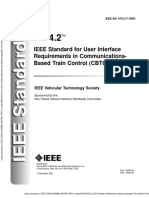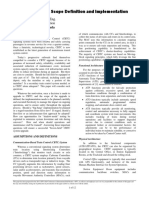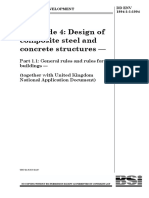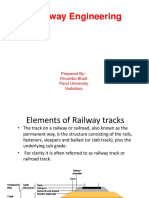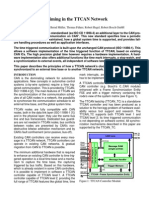IRSE Exam Syllabus ModA v3.0 Mar19
IRSE Exam Syllabus ModA v3.0 Mar19
Uploaded by
Shashi Bhusan SinghCopyright:
Available Formats
IRSE Exam Syllabus ModA v3.0 Mar19
IRSE Exam Syllabus ModA v3.0 Mar19
Uploaded by
Shashi Bhusan SinghCopyright
Available Formats
Share this document
Did you find this document useful?
Is this content inappropriate?
Copyright:
Available Formats
IRSE Exam Syllabus ModA v3.0 Mar19
IRSE Exam Syllabus ModA v3.0 Mar19
Uploaded by
Shashi Bhusan SinghCopyright:
Available Formats
Module A Fundamentals of
Railway Control Engineering
New Syllabus for the IRSE Professional Examination v3.0
Introduction
IRSE Council has given the go-ahead for the first changes to the structure of the IRSE
Professional Examination in 25 years. The changes are intended to simplify the module
structure, to introduce modern assessment techniques and to encourage a much wider
population of railway professionals to learn about control and communications principles and
practices whilst maintaining the high status of the exam.
As of 2021, the IRSE Professional Examination will be structured into 4 modules:
Module A - Fundamentals of Railway Control Engineering
Module B - Railway Safety & Systems Engineering
Module C - Principles of Railway Control & Communications Systems
Module D - Applications of Railway Control & Communications Systems
Module A will be available from 2020.
The passing of Module A is a qualification in its own right and, for those that wish to take the full
IRSE Professional Examination, a prerequisite for Modules B, C & D. All four modules must be
passed to obtain the IRSE Professional Examination.
Prepared by:
Trevor Foulkes
Roger Short
Ed Rollings
Hedley Calderbank
Hongsin Kim
Ross Deacon
Tom Corker
Les Brearley
Paul Booth
With further suggestions from EPD Committee members
Approved by Education & Professional Development Committee on 13 March
2019.
IRSE Exam Syllabus ModA v3.0 Mar19 Page 1 of 3
Module A Fundamentals of
Railway Control Engineering
Module A Fundamentals of Railway Control Engineering syllabus
Aim
The aim of this module is to assess the students’ knowledge and understanding of the
broad concepts and principles of railway signalling, telecommunications and systems
engineering. This includes, the context within which railway signalling,
telecommunications and systems engineers work including interfaces with other
railway and non-railway systems and processes. It does not seek to assess in-depth
knowledge of any of the subjects.
In addition to being a prerequisite for entering for Modules B, C & D, the module is
intended to be suitable as a qualification in its own right for the following types of
candidate:
Those working with railway control systems staff who would benefit from
understanding the underlying principles, issues and terminology of the
profession. (e.g. project managers & planners, junior managers & supervisors
of contractors and sub-contractors)
Railway Control & Communications technicians, engineers and managers
whose current level and breadth of knowledge and experience would not
enable them to pass the advanced modules B, C & D.
Learning objectives
To understand:
1. How a railway is operated to provide a safe and reliable service: including the role
of railway control and communications systems, operational staff & rules and how
these may be impacted by human factors
2. Railway control and communications philosophy and high-level principles: including
safety and efficiency of train movements
3. Safety Engineering principles as applicable to a railway: hazard and risk
assessment, identification and analysis techniques
4. The basic concepts of railway signalling and control systems: including the
functions of an interlocking; train detection and routing; traffic management;
operational and business communication systems
5. The functionality and potential limitations of the various types of signalling,
telecommunications and control equipment (e.g. mechanical, colour-light or in-cab
signalling; UHF, GSM-R, or public radio; copper or fibre cables; PDH, SDH or IP
transmission systems)
6. The basic concepts of a system lifecycle: including requirements definition,
application design, software production, system configuration, installation, testing,
commissioning and safety assurance.
7. How maintenance, inspection and testing keep the railway safe and reliable.
Concepts of dependability (reliability, availability, maintainability, safety, security)
and operability.
IRSE Exam Syllabus ModA v3.0 Mar19 Page 2 of 3
Module A Fundamentals of
Railway Control Engineering
8. The basic concepts of design of fail-safe hardware and high-integrity software e.g.
design for safe output, fail safe, safety integrity levels
9. Governance applicable through standards, procedures, legislation and regulations
which apply to operating and changing a railway.
10. The interfaces and interactions between railway control and communications and
related systems within the railway and stakeholders, including: operations, rolling
stock, permanent way, electrification, power, evacuation system, structures,
tunnels and stations
11. The role of railway control and communications in functions other than the control of
train movement, including: control and protection of road and pedestrian traffic at
level crossings, management of passenger movement at stations, protection of
passenger/train interface at stations, protection of staff on or about the track &
management of emergencies, including provision of alarms and general
telecommunications
To be able to:
Demonstrate knowledge of the principles, applications and terminology of railway
control and communications, its equipment and the interfaces and interactions with
related systems.
IRSE Exam Syllabus ModA v3.0 Mar19 Page 3 of 3
You might also like
- Manual Tecnico Bob Cat 85c Volvo CD PDFDocument190 pagesManual Tecnico Bob Cat 85c Volvo CD PDFdcoronado048775% (4)
- PVI-RS485-MODBUS-RTU - ModBus Register Mapping Centrainverter - V1.13Document27 pagesPVI-RS485-MODBUS-RTU - ModBus Register Mapping Centrainverter - V1.13Nicola Traficante100% (2)
- Farmlot Subdivision July 18 2023Document66 pagesFarmlot Subdivision July 18 2023al bentulan100% (5)
- IEEE Standard For User Interface Requirements in Communications-Based Train Control (CBTC) SystemsDocument26 pagesIEEE Standard For User Interface Requirements in Communications-Based Train Control (CBTC) SystemsShashi Bhusan Singh100% (1)
- CLC-TR 50126-2-2007Document135 pagesCLC-TR 50126-2-2007alejandro100% (1)
- Aftac 2Document2 pagesAftac 2Daniel GheorgheNo ratings yet
- IRSE Green BookDocument2 pagesIRSE Green BookBunkun150% (1)
- Sample Assessment QuestionsDocument31 pagesSample Assessment QuestionsVidya SagarNo ratings yet
- IRSE Textbook Synopsis - Mar2021Document29 pagesIRSE Textbook Synopsis - Mar2021xbwsfbNo ratings yet
- IRSE Exam - Module 3 Study Guide - v1.1 Jan 2017 PDFDocument87 pagesIRSE Exam - Module 3 Study Guide - v1.1 Jan 2017 PDFrajimurugan100% (1)
- Level 2: Signalling Principles Handbook - Interlocking RenewalsDocument6 pagesLevel 2: Signalling Principles Handbook - Interlocking Renewalsm rioNo ratings yet
- CBTC Upgrade Scope Definition and Implementation: Kingston, CanadaDocument12 pagesCBTC Upgrade Scope Definition and Implementation: Kingston, CanadarajimuruganNo ratings yet
- RATP Safety Approach For Railway Signalling Systems PDFDocument25 pagesRATP Safety Approach For Railway Signalling Systems PDFpoketupi100% (4)
- Seminar (Ec405) Electronics in Rail Metro SystemDocument48 pagesSeminar (Ec405) Electronics in Rail Metro Systemmeet261998No ratings yet
- Alstom 12" LED Flashing Light AssemblyDocument24 pagesAlstom 12" LED Flashing Light AssemblyDJNo ratings yet
- Eurocode 4 318D20F-CIS888614800083378 PDFDocument160 pagesEurocode 4 318D20F-CIS888614800083378 PDFmarineugen100% (1)
- Makie HD 1521 Powered Loudspeakers PDFDocument37 pagesMakie HD 1521 Powered Loudspeakers PDFJUAN CARLOS TARMA CASTILLONo ratings yet
- Axle Counter Modern ChallengesDocument23 pagesAxle Counter Modern Challengessusmita_sauNo ratings yet
- 8 Back To Basics InterlockingDocument16 pages8 Back To Basics InterlockingSivaji KotipalliNo ratings yet
- Traction Return, Track Circuits and Bonding SPG 0709Document45 pagesTraction Return, Track Circuits and Bonding SPG 0709Manoj Kumar M100% (1)
- Basic Concepts of SignallingDocument285 pagesBasic Concepts of Signallingj320f samsung100% (1)
- L1-SDD-STD-001 - Train Protection and Warning SystemDocument14 pagesL1-SDD-STD-001 - Train Protection and Warning SystemCK Tang100% (1)
- Comparison of The Broken Rail Detection SystemsDocument8 pagesComparison of The Broken Rail Detection Systemsarshadali13833100% (1)
- Braking Systems in Railway Vehicles PDFDocument6 pagesBraking Systems in Railway Vehicles PDFdilipNo ratings yet
- Test Specification For Eurobalise FFFIS-subset-085 PDFDocument341 pagesTest Specification For Eurobalise FFFIS-subset-085 PDFMickNo ratings yet
- 7 - RB Etcs AcademyDocument25 pages7 - RB Etcs Academyhay902100% (1)
- Part 2 Railway Points and Crossings Final PDFDocument45 pagesPart 2 Railway Points and Crossings Final PDFOm Singh100% (1)
- Worldwide UTO and DTO Transit SystemsDocument15 pagesWorldwide UTO and DTO Transit SystemsVivek AgarwalNo ratings yet
- As 4292.4-2006 Railway Safety Management Signalling and Telecommunications Systems and EquipmentDocument8 pagesAs 4292.4-2006 Railway Safety Management Signalling and Telecommunications Systems and EquipmentSAI Global - APACNo ratings yet
- How Track Circuits Detect and Protect TrainsDocument7 pagesHow Track Circuits Detect and Protect Trainstco_99100% (2)
- Railway Group StandardDocument34 pagesRailway Group StandardSemifallen0% (1)
- Person in Charge of Possession (Picop) : KeypointsDocument24 pagesPerson in Charge of Possession (Picop) : KeypointsPrakash Rao100% (1)
- Axle Counter SystemsDocument23 pagesAxle Counter SystemsSivaji KotipalliNo ratings yet
- Railway Group Standards PDFDocument179 pagesRailway Group Standards PDFDan AguNo ratings yet
- California High-Speed Rail Authority - A Holistic Program Life-Cycle Approach To RAMDocument55 pagesCalifornia High-Speed Rail Authority - A Holistic Program Life-Cycle Approach To RAMNeilcsNo ratings yet
- CBTC Moving Block Principle - Railway Signalling ConceptsDocument16 pagesCBTC Moving Block Principle - Railway Signalling ConceptsVIPIN DOBHALNo ratings yet
- Indian RailwaysDocument22 pagesIndian RailwayssuyogNo ratings yet
- Mod2 Irse Study Pack Mod2 PJW 080326finalDocument484 pagesMod2 Irse Study Pack Mod2 PJW 080326finalshuangjiang huNo ratings yet
- As 4292.3-2006 Railway Safety Management Rolling StockDocument8 pagesAs 4292.3-2006 Railway Safety Management Rolling StockSAI Global - APACNo ratings yet
- Railway Intelligent Transportation System Architecture and Implementation Viliam LENDEL Michal VARMUS1Document14 pagesRailway Intelligent Transportation System Architecture and Implementation Viliam LENDEL Michal VARMUS1AdiKalem0% (1)
- CDC-Booklet On S&TDocument136 pagesCDC-Booklet On S&TAbhijitNo ratings yet
- VOL 2b-Particular Design and Performance SpecificationsDocument126 pagesVOL 2b-Particular Design and Performance SpecificationsAngel Lisette LaoNo ratings yet
- Catalogue of Network Rail Standards NR - CAT - STP - 001-Issue-110 PDFDocument232 pagesCatalogue of Network Rail Standards NR - CAT - STP - 001-Issue-110 PDFDoru ToaderNo ratings yet
- European Railway Signalling by Bailey, Institution of Railway Signal EngineersDocument385 pagesEuropean Railway Signalling by Bailey, Institution of Railway Signal EngineersJelena BrcanskiNo ratings yet
- Guideline Effective Control and Management of Railway Operations PDFDocument22 pagesGuideline Effective Control and Management of Railway Operations PDFAmir AliffNo ratings yet
- AF-902 and AF-904Document99 pagesAF-902 and AF-904Lim Seok WooNo ratings yet
- 11 CES Railway-Control-SystemsDocument70 pages11 CES Railway-Control-SystemskvreddyNo ratings yet
- IIT IMRT RAMS Program BrochureDocument4 pagesIIT IMRT RAMS Program BrochureRabbuni GangavarapuNo ratings yet
- MVN BooksDocument1 pageMVN BooksLucky2503No ratings yet
- Construction and Maintenance of Underground Railway Track To Safety StandardDocument6 pagesConstruction and Maintenance of Underground Railway Track To Safety Standardmunim870% (1)
- Railway Construction and Operation Requirements: Structural A N D Electrical ClearancesDocument19 pagesRailway Construction and Operation Requirements: Structural A N D Electrical ClearanceskumarNo ratings yet
- Part 5, Rail Transit CapacityDocument134 pagesPart 5, Rail Transit CapacityJonor AtaatNo ratings yet
- A Glance at Transit System SafetyDocument11 pagesA Glance at Transit System SafetyIngeniería ICRAMS SPA100% (1)
- Abstracts RailEng04 v2Document157 pagesAbstracts RailEng04 v2antonioNo ratings yet
- Risk Analysis Yarra TramsDocument18 pagesRisk Analysis Yarra TramsKaram Ashraff100% (1)
- As 4292.2-2006 Railway Safety Management Track Civil and Electrical InfrastructureDocument8 pagesAs 4292.2-2006 Railway Safety Management Track Civil and Electrical InfrastructureSAI Global - APACNo ratings yet
- Preemtionmanual 2004Document170 pagesPreemtionmanual 2004igoklyNo ratings yet
- Cenelec Standards For IrsteDocument24 pagesCenelec Standards For IrstemachinmayNo ratings yet
- L1 Che STD 010Document27 pagesL1 Che STD 010MichaelNo ratings yet
- Elements of Railway TracksDocument37 pagesElements of Railway TracksKaushal MehtaNo ratings yet
- Automatic Systems For Wear Measurement of Contact Wire in RailwaysDocument6 pagesAutomatic Systems For Wear Measurement of Contact Wire in Railwaysmkashkooli_scribdNo ratings yet
- Railway Freight Car Inspection and Safety Rules: December 9, 2014Document17 pagesRailway Freight Car Inspection and Safety Rules: December 9, 2014viksursNo ratings yet
- ExamSyllabusModA v4.3 Apr23Document1 pageExamSyllabusModA v4.3 Apr23Snigddha KNo ratings yet
- ExamSyllabus Module C v3 Mar2019Document3 pagesExamSyllabus Module C v3 Mar2019sahil 02No ratings yet
- Institute of Leadership and Management: Module 311: Developing Yourself and OthersDocument24 pagesInstitute of Leadership and Management: Module 311: Developing Yourself and OthersShashi Bhusan SinghNo ratings yet
- ILM Handbook Level 3 Leadership and ManagementDocument40 pagesILM Handbook Level 3 Leadership and ManagementShashi Bhusan SinghNo ratings yet
- Barriers To LearningDocument11 pagesBarriers To LearningShashi Bhusan SinghNo ratings yet
- SOF Does Not Vouch For Exam Results Displayed by Any 3rd Party. For Authentic Results, Please Visit SOF Site OnlyDocument3 pagesSOF Does Not Vouch For Exam Results Displayed by Any 3rd Party. For Authentic Results, Please Visit SOF Site OnlyShashi Bhusan SinghNo ratings yet
- ILM Module 1Document16 pagesILM Module 1Shashi Bhusan SinghNo ratings yet
- IRSEDocument28 pagesIRSEShashi Bhusan SinghNo ratings yet
- IRSE CBTC - and - Beyond - 2017 - Adeeb - KhawjaDocument22 pagesIRSE CBTC - and - Beyond - 2017 - Adeeb - KhawjaShashi Bhusan SinghNo ratings yet
- 9.1 Beginners Guide To Derivatives - Futures & Options - Axis Direct 9.1Document7 pages9.1 Beginners Guide To Derivatives - Futures & Options - Axis Direct 9.1Shashi Bhusan SinghNo ratings yet
- 9.3 Futures Contract Introduction 9.3Document6 pages9.3 Futures Contract Introduction 9.3Shashi Bhusan SinghNo ratings yet
- 1.2 IRSE Conv 2013 Swedish Rail - Per OlofssonDocument35 pages1.2 IRSE Conv 2013 Swedish Rail - Per OlofssonShashi Bhusan SinghNo ratings yet
- A Us Rail 2014 Call For PapersDocument2 pagesA Us Rail 2014 Call For PapersShashi Bhusan SinghNo ratings yet
- IRSEDocument28 pagesIRSEShashi Bhusan SinghNo ratings yet
- 3.4 IRSE Conv 2013 Siemens PresentationDocument29 pages3.4 IRSE Conv 2013 Siemens PresentationShashi Bhusan SinghNo ratings yet
- 2014 Convention - Notice To Members v2Document2 pages2014 Convention - Notice To Members v2Shashi Bhusan SinghNo ratings yet
- Sikkim Manipal University Directorate of Distance Education: Examination ResultDocument1 pageSikkim Manipal University Directorate of Distance Education: Examination ResultShashi Bhusan SinghNo ratings yet
- E-Statement of Marks of The Examination Held in Aug2015: Shashi Bhusan SinghDocument1 pageE-Statement of Marks of The Examination Held in Aug2015: Shashi Bhusan SinghShashi Bhusan SinghNo ratings yet
- Sikkim Manipal University Directorate of Distance Education: Examination ResultDocument1 pageSikkim Manipal University Directorate of Distance Education: Examination ResultShashi Bhusan SinghNo ratings yet
- The 5 Most Common Questions About Yourself Asked During An Interview AreDocument51 pagesThe 5 Most Common Questions About Yourself Asked During An Interview AreShashi Bhusan SinghNo ratings yet
- Payment Acknowledgment Receipt: Roll No Name Receipt Date Activity Program Year SessionDocument1 pagePayment Acknowledgment Receipt: Roll No Name Receipt Date Activity Program Year SessionShashi Bhusan SinghNo ratings yet
- A 31 - 14 PDFDocument4 pagesA 31 - 14 PDFKibarNo ratings yet
- VMG5313-B30A - Version 5.00 PDFDocument398 pagesVMG5313-B30A - Version 5.00 PDFnikok66No ratings yet
- Aim Infotech: Lotus Evora (V6) Exige (V6)Document4 pagesAim Infotech: Lotus Evora (V6) Exige (V6)jorge Angel LopeNo ratings yet
- SATIP-T-628-01 Rev 7Document3 pagesSATIP-T-628-01 Rev 7sajidNo ratings yet
- IBM XIV Storage System User Manual: Version 10.2.4.bDocument500 pagesIBM XIV Storage System User Manual: Version 10.2.4.bJamie AllenNo ratings yet
- Indicators: Different Types of IndicatorsDocument4 pagesIndicators: Different Types of Indicatorshammouda25No ratings yet
- Advanced Services' Building Core Networks With Boot Camp: Ospf, Is-Is, BGP and MPLSDocument50 pagesAdvanced Services' Building Core Networks With Boot Camp: Ospf, Is-Is, BGP and MPLSaabekhit5601No ratings yet
- GSM QoSDocument12 pagesGSM QoSMohammadNo ratings yet
- Previews 2224036 PreDocument9 pagesPreviews 2224036 Prefayssal.hcNo ratings yet
- Timing in TTCANDocument8 pagesTiming in TTCANPOWERBASE100% (1)
- Civ-Su-6001-C - Design of BuildingsDocument37 pagesCiv-Su-6001-C - Design of BuildingsBolarinwaNo ratings yet
- Secure Web Gateway Virtual Appliance Initial Configuration GuideDocument50 pagesSecure Web Gateway Virtual Appliance Initial Configuration GuideDhananjai SinghNo ratings yet
- CL Abap ZipDocument4 pagesCL Abap ZipBalaji VengateshNo ratings yet
- Configuring Point-To-Point GRE VPN Tunnels - Unprotected GRE & Protected GRE Over IPSec TunnelsDocument7 pagesConfiguring Point-To-Point GRE VPN Tunnels - Unprotected GRE & Protected GRE Over IPSec Tunnelsst_kannanNo ratings yet
- Adobe Illustrator cs5 PodręcznikDocument526 pagesAdobe Illustrator cs5 Podręczniktrack112233No ratings yet
- YSD-P02-0508-HV-BKG-MS-00024 (01) - Air Handling Units-B PDFDocument1,168 pagesYSD-P02-0508-HV-BKG-MS-00024 (01) - Air Handling Units-B PDFZac Riego100% (2)
- Perchoroethylene Catalyst Grade: Product Data SheetDocument2 pagesPerchoroethylene Catalyst Grade: Product Data SheetMuraadahmedAhmedNo ratings yet
- BECG PPT Module IDocument38 pagesBECG PPT Module ISunitha JenaNo ratings yet
- Team - 01 Engineering Analysis Report PDFDocument21 pagesTeam - 01 Engineering Analysis Report PDFRupak GhawghaweNo ratings yet
- 02-575-650-003 DNA-A211-I Software Upgrade Utility Usage ProcedureDocument10 pages02-575-650-003 DNA-A211-I Software Upgrade Utility Usage ProceduresathishNo ratings yet
- 3 FinProcess 11 PostJE TemplateDocument8 pages3 FinProcess 11 PostJE Templateaseem siddiqueNo ratings yet
- Internal Audit Progress ReportDocument23 pagesInternal Audit Progress ReportAhmad fayyazNo ratings yet
- Series 656 Specification SheetDocument1 pageSeries 656 Specification SheetWattsNo ratings yet
- Annexure 1 - Is 16087 - 2016 PDFDocument5 pagesAnnexure 1 - Is 16087 - 2016 PDFashishjawale7100% (2)
- Wheatland EMT Spec Sheet 2008Document2 pagesWheatland EMT Spec Sheet 2008abd mohamedNo ratings yet



